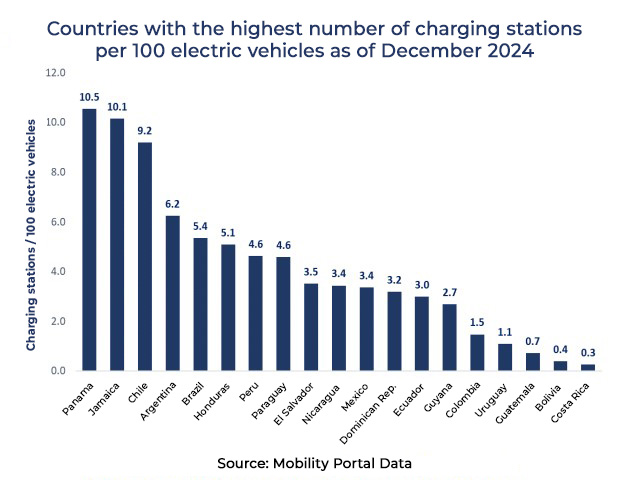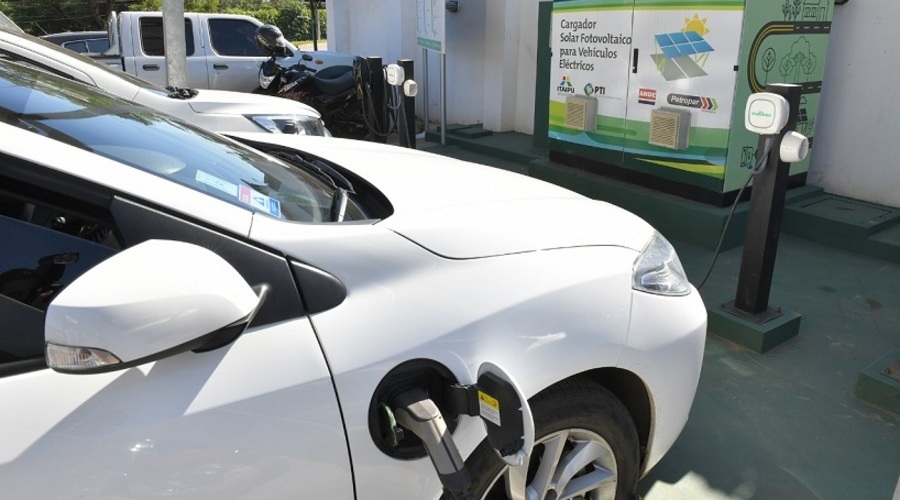In the first six months of 2025, Paraguay has experienced notable growth in the sales of electric vehicles (EVs) and plug-in hybrid vehicles, but the charging infrastructure needed to support this development has not advanced at the same pace.
In particular, Law 6925, which was enacted in 2022 with the aim of promoting the installation of public charging stations in the country, has not had the expected impact due to the lack of regulation and limited pressure from local authorities. The private sector also has little participation.
“Law 6925 has had no significant impact on the public sector. The lack of regulation and the absence of sanctions for municipalities that do not comply with the established requirements have hindered any substantial progress,” said Pablo Pasquali, former manager of BYD Paraguay and current automotive advisor, in an interview with Mobility Portal Latin America.
Slow Charging: An Expansion that Does Not Keep Pace
According to data from Mobility Portal Data, imports of plug-in hybrid electric vehicles (PHEVs) have surged, with a 296.6% growth between the first quarter of 2024 and 2025.
Additionally, pure electric vehicles (BEVs) also show a significant increase, with a 138.1% rise in imports compared to the same period the previous year. However, public charging infrastructure has not kept up with this increase.

The Latin American Energy Organisation (OLADE) reveals that Paraguay has only 4.6 charging stations for every 100 electric vehicles in circulation, well below the recommended 10 stations.
Although sources consulted by Mobility Portal Latin America assert that this alone is not an obstacle to electromobility, it is a major decelerator of the energy transition momentum reflected in the Paraguayan market.

Law 6925, enacted in 2022, established the need to create public charging infrastructure in Paraguay, but three years after its approval, the law remains unregulated, and local authorities have not been pressured to meet the established goals.
Pasquali emphasised that “the law has had no significant impact on the public sector, due to the lack of regulation and the absence of sanctions that force municipalities to comply with the requirements.”
The “Ruta Verde” project, which aimed to install charging stations on the country’s main routes, is also stalled, further exacerbating the situation regarding public infrastructure.
Private Sector Initiatives in Paraguay: A Positive Outlook for the Sector
In contrast to the public sector’s passivity, private companies have been more proactive. According to Díaz, “the private sector is responding to the growing demand for charging infrastructure, with more than 45 fast-charging points in operation.”
However, this private effort remains insufficient to meet the total projected demand. “This slowdown in investment is related to the phenomenon of plug-in hybrid vehicles, which do not require fast chargers, thus reducing the pressure on infrastructure,” he explains.

Pasquali and Díaz agree that the behaviour pattern of Paraguayan users indicates that most of their zero and low-emission vehicles have their own home charging installation.
APVE confirms this with data: more than 98% of electric vehicle users in Paraguay charge their cars at home, which reduces pressure on public infrastructure.
The current situation of charging infrastructure in Paraguay requires a comprehensive approach to address the current stagnation.
Firstly, it is essential for the government and local authorities to regulate Law 6925 and allocate specific resources for the installation of public chargers.
“Public infrastructure is key to fostering consumer confidence and facilitating the mass adoption of electric vehicles,” said Pasquali.
Additionally, Díaz suggested that “it is important for private investments in fast chargers to continue, but this effort must be accompanied by public policies that promote the installation of these chargers at the national level.”
DISCOVER MOBILITY PORTAL DATA
Discover Mobility Portal Data, a new exclusive market intelligence platform offering reliable data and key reports to support smart decision-making across the automotive sector — covering both combustion and electric vehicles, as well as charging infrastructure.
Research, trend analysis, and neatly organised statistics presented with clarity and precision, alongside up-to-date insights — all just one click away. With Mobility Portal Data, good decisions are on the horizon.
READ MORE
-
6 days left: How to make EV charging stations reliable, visible and durable?
On 5 November, Data Modul will host a web seminar on HMI solutions for EV charging stations — a must-attend event for manufacturers seeking to innovate and optimise their products.
-
Rightcharge secures £1.6M to boost EV charging payments for Europe’s fleets
Public charging remains fragmented and reimbursing employees for home charging is often slow and error-prone. However, fleets using Rightcharge can reduce charging costs by up to 90%.
-
Strong demand for France’s social EV leasing with 41,500 cars already leased
To date, over 41,500 vehicles have been leased, including more than 11,360 by beneficiaries who live or work in areas where air quality is a concern.









